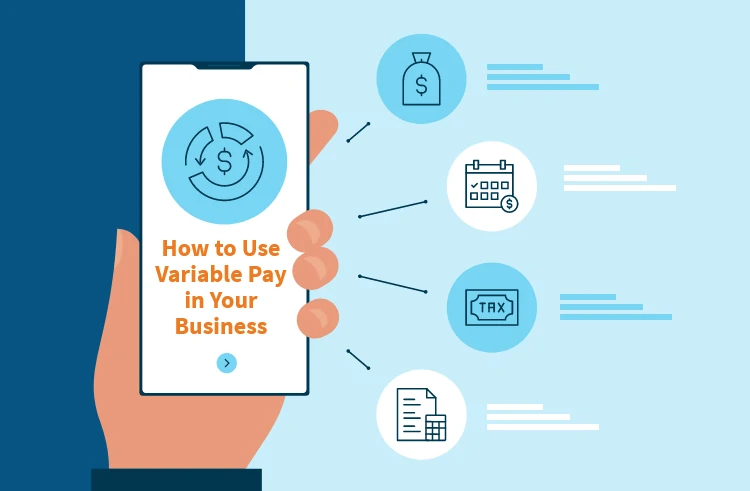How to Use Variable Pay in Your Business

- Step 1. Understand your business needs
- Step 2. Choose the right variable pay structure
- Step 3. Communicate the variable pay plan clearly
- Step 4. Set specific targets and metrics
- Step 5. Integrate variable pay into your compensation package
- Step 6. Monitor and adjust the variable pay structure
- Step 7. Evaluate the impact on employee engagement and retention
Variable pay is a strategy used by organizations to motivate employees to do their jobs effectively and reward them for their performance. Unlike a fixed salary, variable compensation, like profit sharing and incentive pay, can lead to higher employee engagement that drives the company's performance and success.
Sticking to the standard fixed pay often leaves employees demotivated and doing the bare minimum as their performance does not impact their income. Organizations can make use of tools like Salary.com's Consulting Services to better structure their competitive compensation packages.
What is variable pay?
Variable pay is additional compensation that gets added to an employee’s base salary, with the amount changing between pay periods. Employers offer performance incentives, typically between 8% to 19% of the base salary as part of a competitive compensation package to reward employees.
Employees earn incentive pay through various forms of incentive plans that are often tied to an employee's performance or growth-based targets. When employees meet or exceed specific targets, or when the company achieves its growth goals, they receive extra financial rewards such as performance bonuses or profit sharing. This has proven to be an effective way to encourage employees to contribute more.
Salary.com's Consulting Service can streamline the compensation plan implementation, including variable pay, through innovative and efficient data-driven solutions.
Different types of variable pay
These are the main types of variable pay and organizations may grant these for several reasons and in different forms.
Sales commission
A form of performance-based compensation for sales teams that motivate them to close deals and drive revenue. A commission structure is typically calculated as a percentage of the sales made by the employee, often with tiered structures where higher sales volumes mean higher commission rates.
Performance-based bonus
Performance-based bonuses are designed to reward individual or team achievements. This is offered when employees meet or exceed specific targets or goals, such as sales quotas or safety records. The bonus amount can be a percentage of the employee's base pay or a fixed dollar amount, with higher performance yielding greater rewards.
Profit-sharing
Employers distribute a portion of the company's profits among employees. This links the bonus to the organization's overall financial success rather than individual performance. Employers can decide how much of the profit to share and may allocate it based on factors such as role, performance, or tenure with the company.
Differential pay
Accounts for specific circumstances or working conditions. This includes shift differentials for working outside regular hours or holiday pay for working on holidays. While not federally mandated, employers may offer these incentives to attract and retain employees for positions with irregular work schedules or demanding conditions.
Why offer variable pay?
Pay is the most important factor for job seekers and employees alike. 64% of job seekers rank it as the no. 1 reason for taking a new job. Employers offer performance-based pay that will serve as a financial reward beyond base salary to help boost employee performance, retention, and job satisfaction.
In sales-driven businesses, performance pay motivates sales teams to meet or exceed goals through incentives like commissions and performance bonuses.
Benefits of variable pay
There are several benefits to offering variable pay; especially for businesses that are well-suited to a variable compensation plan. Some reasons to consider offering performance-based pay include:
Improved accountability
Variable pay instills a sense of ownership in employees that drives them to take responsibility for achieving specific targets and goals. Tying compensation directly to performance offers a fair way to reward individual and team achievements.
Cost savings for employers
Implementing a performance bonus allows employers to lower fixed base salaries and instead allocate a portion of that pay as incentive based, such as bonuses or sales commissions. This enables businesses to maintain competitive compensation packages while managing costs effectively.
Talent retention and attraction
It helps attract and retain top talent by offering an additional cash bonus for performance. This allows companies to create a competitive compensation package that motivates individuals to stay and excel within the organization.
Framework for progress evaluation
Establishes clear metrics and performance criteria for evaluating employee progress. Supervisors can use these metrics to track performance, provide feedback, and incentivize desired behaviors, to develop a culture of continuous improvement.
Clarity in work expectations
Provides clarity for both employers and employees regarding performance expectations and reward criteria.
Challenges in implementing a variable compensation model
While performance-linked pay is an effective strategy to motivate employees, implementing it poses a few challenges of its own, such as:
Designing effective variable pay structures: It can be tricky to create performance-linked compensation that aligns with both company objectives and individual employee satisfaction. If not carefully structured, it can lead to confusion or resentment among employees who may perceive inequities in how rewards are distributed.
Ensuring tax compliance and transparency: Employers need to be aware of tax regulations to structure performance-based bonuses in a way that maximizes financial rewards for employees while remaining compliant with tax laws and avoiding potential legal consequences.
-
Managing employee expectations: While variable compensation can be a powerful tool to reward employees based on their performance, setting overly ambitious or unrealistic goals may result in employee burnout or disengagement.
Competitive Pay Assessment can help assess the market competitiveness of your pay programs and make recommendations for adjustments based on your recruiting and retention goals.
Retaining top talent with competitive compensation: Relying too heavily on incentives like stock options or performance bonuses places organizations at risk of losing valuable employees to competitors offering more lucrative compensation packages.
-
Balancing fixed and variable pay: Employers must balance between fixed pay (base salary) and incentive pay to effectively motivate employees while managing costs. Overemphasis on variable compensation may create financial instability for employees who rely heavily on bonuses or commissions.
To help address this issue, organizations can take advantage of Salary Structure Building to model competitive salary structures and assign appropriate salary ranges.
How to use variable pay in your business
Implementing a well-designed variable pay plan takes a lot of careful consideration and collaboration with other departments. Here is a step-by-step guide on how to create and effectively implement a performance-linked bonus:
-
Step 1: Understand your business needs
Assess your company's objectives, financial health, and employee performance. Determine areas where variable pay could effectively motivate employees and drive business results, such as sales team performance or individual employee goals.
-
Step 2: Choose the right variable pay structure
Select from various forms of performance incentives, including performance bonuses, profit-sharing plans, sales commissions, or even a combination of them. Tailor the structure to align with your organization's goals and desired outcomes to ensure it is a fair way to reward employees for their contributions.
Organizations can also use Variable Pay Program to design long- and short-term incentive programs that reward employees fairly and motivate them to achieve goals and deliver results.
-
Step 3: Communicate the variable pay plan clearly
Clearly outline the details of the variable compensation plan to your entire workforce. Explain how employees can earn variable compensation, whether it is based on individual performance, team achievements, or the company's overall success.
-
Step 4: Set specific targets and metrics
Establish clear and measurable targets for earning performance bonuses, whether they are based on sales targets, customer satisfaction metrics, or other key performance indicators. Ensure that employees understand what they need to achieve to qualify for variable payments.
HR Metrics & Analytics can help review current metrics, establish benchmarks, and provide a model for measuring effectiveness over time.
-
Step 5: Integrate variable pay into your compensation package
Incorporate variable compensation alongside fixed salary components to create a comprehensive compensation package. This combination will help motivate employees and provide income stability through fixed amounts.
-
Step 6: Monitor and adjust the variable pay structure
Regularly review the effectiveness of your variable compensation structure in motivating employees and driving business results. Adjust the plan as needed to ensure it remains competitive and aligned with your organization's changing goals.
-
Step 7: Evaluate the impact on employee engagement and retention
Measure the impact of variable pay on employee engagement, retention, and overall performance. Use feedback from employees and performance metrics to refine your variable pay strategy and continue motivating and rewarding top talent effectively.
Variable pay not only encourages employee engagement but also provides a fair way to compensate talented employees based on their contributions to the organization's success. Without it, organizations may struggle to retain top talent as fixed pay alone may not adequately reward employees for their efforts or encourage them to go above and beyond in their roles. With Salary.com's Consulting Services, you can solve your variable pay challenges through innovative and efficient data-driven solutions.
Insights You Need to Get It Right









